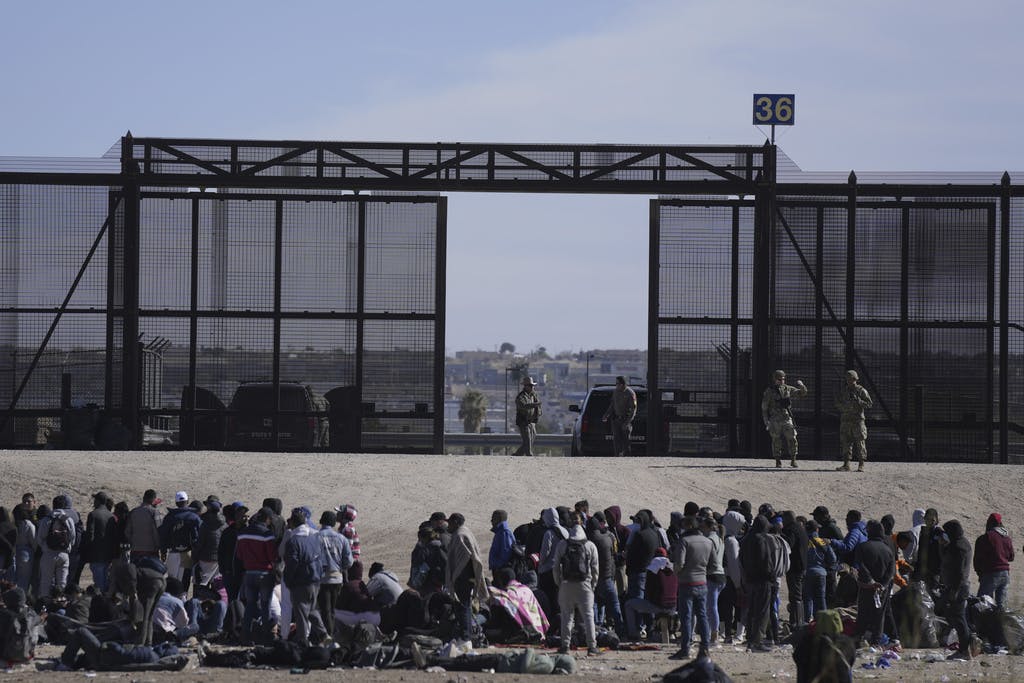Attention on the Border Puts Pressure on Bipartisan Group of Senators To Extend Mass Expulsion
Senators Sinema and Tillis are at the center of a deal that could extend Title 42 style policy for two more years.

Before Title 42 has even ended, viral videos are circulating showing crowds of migrants massing at the southern border — just the sort of attention that could spur a bipartisan group of senators into finally taking action on border security.
On Sunday and again on Monday, a Fox News correspondent, Bill Melugin, shared videos showing hundreds of migrants walking across the border into Brownsville, Texas.
The videos quickly spread through conservative circles online, attracting the attention of a billionaire, Elon Musk, and a TV news host, Kari Lake, who said in a tweet the video of migrants standing in line was proof of “a full-fledged INVASION.”
Early Monday, Texas deployed a newly trained National Guard Unit, the Tactical Border Force, to the border in anticipation of the end of Title 42, a move that has already attracted attention online.
“They will be deployed to hot spots along the border to intercept, to repel, and to turn back migrants who are trying to enter Texas illegally,” Governor Abbott said at a news conference Monday.
The intense attention online and in the press could be the sort of pressure needed for a bipartisan group of senators to finally cut a deal on immigration and border security, something Congress has been unable to do for nearly 40 years.
The last major piece of legislation on immigration and the border was passed in 1986, and though there have been numerous attempts since then, such as the Border Security, Economic Opportunity, and Immigration Modernization Act of 2013, none have been enacted.
The proposal is being spearheaded by Senators Sinema and Tillis, with Senators Manchin and Cornyn co-sponsoring the bill. The measure would extend the mass expulsion policies used under Title 42 while protecting migrants whose return to their home countries would threaten their lives.
“Despite our repeated calls, the Biden administration failed to plan ahead and implement a realistic, workable plan; our legislation gives them more time to put a plan in place that will secure our border, protect Arizona communities on the frontlines of this crisis, and ensure migrants are treated fairly and humanely,” Ms. Sinema said in a statement.
Both Ms. Sinema and Mr. Manchin have taken steps to distance themselves from the administration heading into 2024, though neither have officially announced they are running for re-election.
Ms. Sinema and Mr. Tillis of North Carolina were also at the center of a deal-in-the-making last December that eventually fell through before the end of the 117th Congress. The earlier measure focused on providing a path to citizenship for “Dreamers,” as some migrants brought to America as children are known, as well as increased funding for border security measures.
The new deal, though, wouldn’t concern these potentially more permanent solutions to the many problems surrounding immigration and border security. It would instead simply punt the problem to the next Congress with a de facto two-year extension of Title 42.
“We’ve had two years to prepare for this,” Ms. Sinema told CBS News Sunday. “I think there’s a system in Washington, D.C., that is deeply disconnected from the real lives and experiences of border communities and the migrants that seek to come to this country.”
The key difference between the Sinema-Tillis proposal and Title 42 would be that the new bill would not be reliant on a public health emergency as is Title 42, which was initially enacted as a public health measure during the Covid pandemic.
Although it’s not clear if and when the measure will come up for a vote, there may be enough Democrats in the Senate to overcome the filibuster, based on the positions candidates espoused during the campaign season. Both Senators Fetterman and Beasley said that they would be wary of ending Title 42 without a comprehensive plan in place to overhaul the American immigration system.
Whether this wariness translates into a vote for a two-year extension of the policy isn’t known and likely depends on what happens at the border and in the senators’ home states once the current policy ends.
In the House, Speaker McCarthy has promised to pass a bill that would make it harder for asylum seekers to apply for protection in America and would allow the Department of Homeland Security to shut down ports of entry.
It’s not clear whether this measure would pass in the House, with some representatives, like Congressman Tony Gonzales, a Republican who represents a district spanning a significant portion of the Texas border, saying he wouldn’t support the bill.
With a slim majority in the House, only four Republican representatives would have to join Mr. Gonzales to kill the bill. Its chances to clear a filibuster in the Democratically controlled Senate are also slim.

